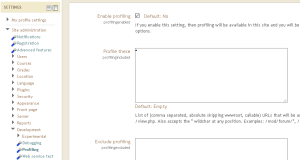Aun cuando puedes encontrar en esta página una descripcion detallada de la instalación, aqui te muestro una instalación paso a paso de los comando aplicados en el orden que se expresa para linux, exceptuando la de php-devel que la instale debido a que no estaba. Esta instalación se hizo en RedHat 6.1.
[root@aro-cl oraclePhp]# rpm -Uvh oracle-instantclient11.2-basic-11.2.0.3.0-1.x86_64.rpm
Preparing... ########################################### [100%]
1:oracle-instantclient11.########################################### [100%]
[root@aro-cl oraclePhp]# rpm -Uvh oracle-instantclient11.2-devel-11.2.0.3.0-1.x86_64.rpm
Preparing... ########################################### [100%]
1:oracle-instantclient11.########################################### [100%]
[root@aro-cl oraclePhp]# rpm -Uvh php-devel-5.3.3-3.el6.x86_64.rpm
warning: php-devel-5.3.3-3.el6.x86_64.rpm: Header V3 RSA/SHA256 Signature, key ID fd431d51: NOKEY
Preparing... ########################################### [100%]
1:php-devel ########################################### [100%]
[root@aro-cl oraclePhp]# tar -xzf oci8-1.4.7.tgz
[root@aro-cl oraclePhp]# cd oci8-1.4.7
[root@aro-cl oci8-1.4.7]# phpize
Configuring for:
PHP Api Version: 20090626
Zend Module Api No: 20090626
Zend Extension Api No: 220090626
[root@aro-cl oci8-1.4.7]# ./configure --with-oci8=instantclient,/usr/lib/oracle/11.2/client64/lib
checking for grep that handles long lines and -e... /bin/grep
checking for egrep... /bin/grep -E
checking for a sed that does not truncate output... /bin/sed
checking for cc... cc
checking for C compiler default output file name... a.out
checking whether the C compiler works... yes
checking whether we are cross compiling... no
checking for suffix of executables...
checking for suffix of object files... o
checking whether we are using the GNU C compiler... yes
checking whether cc accepts -g... yes
checking for cc option to accept ISO C89... none needed
checking how to run the C preprocessor... cc -E
checking for icc... no
checking for suncc... no
checking whether cc understands -c and -o together... yes
checking for system library directory... lib
checking if compiler supports -R... no
checking if compiler supports -Wl,-rpath,... yes
checking build system type... x86_64-unknown-linux-gnu
checking host system type... x86_64-unknown-linux-gnu
checking target system type... x86_64-unknown-linux-gnu
checking for PHP prefix... /usr
checking for PHP includes... -I/usr/include/php -I/usr/include/php/main -I/usr/include/php/TSRM -I/usr/include/php/Zend -I/usr/include/php/ext -I/usr/include/php/ext/date/lib
checking for PHP extension directory... /usr/lib64/php/modules
checking for PHP installed headers prefix... /usr/include/php
checking if debug is enabled... no
checking if zts is enabled... no
checking for re2c... no
configure: WARNING: You will need re2c 0.13.4 or later if you want to regenerate PHP parsers.
checking for gawk... gawk
checking for Oracle Database OCI8 support... yes, shared
checking PHP version... 5.3.3, ok
checking for ANSI C header files... yes
checking for sys/types.h... yes
checking for sys/stat.h... yes
checking for stdlib.h... yes
checking for string.h... yes
checking for memory.h... yes
checking for strings.h... yes
checking for inttypes.h... yes
checking for stdint.h... yes
checking for unistd.h... yes
checking size of long int... 8
checking checking if we're on a 64-bit platform... yes
checking Oracle Instant Client directory... /usr/lib/oracle/11.2/client64/lib
checking Oracle Instant Client SDK header directory... /usr/include/oracle/11.2/client64
checking Oracle Instant Client library version compatibility... 11.1
checking for a sed that does not truncate output... (cached) /bin/sed
checking for fgrep... /bin/grep -F
checking for ld used by cc... /usr/bin/ld
checking if the linker (/usr/bin/ld) is GNU ld... yes
checking for BSD- or MS-compatible name lister (nm)... /usr/bin/nm -B
checking the name lister (/usr/bin/nm -B) interface... BSD nm
checking whether ln -s works... yes
checking the maximum length of command line arguments... 1966080
checking whether the shell understands some XSI constructs... yes
checking whether the shell understands "+="... yes
checking for /usr/bin/ld option to reload object files... -r
checking for objdump... objdump
checking how to recognize dependent libraries... pass_all
checking for ar... ar
checking for strip... strip
checking for ranlib... ranlib
checking command to parse /usr/bin/nm -B output from cc object... ok
checking for dlfcn.h... yes
checking for objdir... .libs
checking if cc supports -fno-rtti -fno-exceptions... no
checking for cc option to produce PIC... -fPIC -DPIC
checking if cc PIC flag -fPIC -DPIC works... yes
checking if cc static flag -static works... no
checking if cc supports -c -o file.o... yes
checking if cc supports -c -o file.o... (cached) yes
checking whether the cc linker (/usr/bin/ld -m elf_x86_64) supports shared libraries... yes
checking whether -lc should be explicitly linked in... no
checking dynamic linker characteristics... GNU/Linux ld.so
checking how to hardcode library paths into programs... immediate
checking whether stripping libraries is possible... yes
checking if libtool supports shared libraries... yes
checking whether to build shared libraries... yes
checking whether to build static libraries... no
configure: creating ./config.status
config.status: creating config.h
config.status: executing libtool commands
[root@aro-cl oci8-1.4.7]# make install
/bin/sh /root/oraclePhp/oci8-1.4.7/libtool --mode=compile cc -I. -I/root/oraclePhp/oci8-1.4.7 -DPHP_ATOM_INC -I/root/oraclePhp/oci8-1.4.7/include -I/root/oraclePhp/oci8-1.4.7/main -I/root/oraclePhp/oci8-1.4.7 -I/usr/include/php -I/usr/include/php/main -I/usr/include/php/TSRM -I/usr/include/php/Zend -I/usr/include/php/ext -I/usr/include/php/ext/date/lib -I/usr/include/oracle/11.2/client64 -DHAVE_CONFIG_H -g -O2 -c /root/oraclePhp/oci8-1.4.7/oci8.c -o oci8.lo
libtool: compile: cc -I. -I/root/oraclePhp/oci8-1.4.7 -DPHP_ATOM_INC -I/root/oraclePhp/oci8-1.4.7/include -I/root/oraclePhp/oci8-1.4.7/main -I/root/oraclePhp/oci8-1.4.7 -I/usr/include/php -I/usr/include/php/main -I/usr/include/php/TSRM -I/usr/include/php/Zend -I/usr/include/php/ext -I/usr/include/php/ext/date/lib -I/usr/include/oracle/11.2/client64 -DHAVE_CONFIG_H -g -O2 -c /root/oraclePhp/oci8-1.4.7/oci8.c -fPIC -DPIC -o .libs/oci8.o
/bin/sh /root/oraclePhp/oci8-1.4.7/libtool --mode=compile cc -I. -I/root/oraclePhp/oci8-1.4.7 -DPHP_ATOM_INC -I/root/oraclePhp/oci8-1.4.7/include -I/root/oraclePhp/oci8-1.4.7/main -I/root/oraclePhp/oci8-1.4.7 -I/usr/include/php -I/usr/include/php/main -I/usr/include/php/TSRM -I/usr/include/php/Zend -I/usr/include/php/ext -I/usr/include/php/ext/date/lib -I/usr/include/oracle/11.2/client64 -DHAVE_CONFIG_H -g -O2 -c /root/oraclePhp/oci8-1.4.7/oci8_lob.c -o oci8_lob.lo
libtool: compile: cc -I. -I/root/oraclePhp/oci8-1.4.7 -DPHP_ATOM_INC -I/root/oraclePhp/oci8-1.4.7/include -I/root/oraclePhp/oci8-1.4.7/main -I/root/oraclePhp/oci8-1.4.7 -I/usr/include/php -I/usr/include/php/main -I/usr/include/php/TSRM -I/usr/include/php/Zend -I/usr/include/php/ext -I/usr/include/php/ext/date/lib -I/usr/include/oracle/11.2/client64 -DHAVE_CONFIG_H -g -O2 -c /root/oraclePhp/oci8-1.4.7/oci8_lob.c -fPIC -DPIC -o .libs/oci8_lob.o
/bin/sh /root/oraclePhp/oci8-1.4.7/libtool --mode=compile cc -I. -I/root/oraclePhp/oci8-1.4.7 -DPHP_ATOM_INC -I/root/oraclePhp/oci8-1.4.7/include -I/root/oraclePhp/oci8-1.4.7/main -I/root/oraclePhp/oci8-1.4.7 -I/usr/include/php -I/usr/include/php/main -I/usr/include/php/TSRM -I/usr/include/php/Zend -I/usr/include/php/ext -I/usr/include/php/ext/date/lib -I/usr/include/oracle/11.2/client64 -DHAVE_CONFIG_H -g -O2 -c /root/oraclePhp/oci8-1.4.7/oci8_statement.c -o oci8_statement.lo
libtool: compile: cc -I. -I/root/oraclePhp/oci8-1.4.7 -DPHP_ATOM_INC -I/root/oraclePhp/oci8-1.4.7/include -I/root/oraclePhp/oci8-1.4.7/main -I/root/oraclePhp/oci8-1.4.7 -I/usr/include/php -I/usr/include/php/main -I/usr/include/php/TSRM -I/usr/include/php/Zend -I/usr/include/php/ext -I/usr/include/php/ext/date/lib -I/usr/include/oracle/11.2/client64 -DHAVE_CONFIG_H -g -O2 -c /root/oraclePhp/oci8-1.4.7/oci8_statement.c -fPIC -DPIC -o .libs/oci8_statement.o
/bin/sh /root/oraclePhp/oci8-1.4.7/libtool --mode=compile cc -I. -I/root/oraclePhp/oci8-1.4.7 -DPHP_ATOM_INC -I/root/oraclePhp/oci8-1.4.7/include -I/root/oraclePhp/oci8-1.4.7/main -I/root/oraclePhp/oci8-1.4.7 -I/usr/include/php -I/usr/include/php/main -I/usr/include/php/TSRM -I/usr/include/php/Zend -I/usr/include/php/ext -I/usr/include/php/ext/date/lib -I/usr/include/oracle/11.2/client64 -DHAVE_CONFIG_H -g -O2 -c /root/oraclePhp/oci8-1.4.7/oci8_collection.c -o oci8_collection.lo
libtool: compile: cc -I. -I/root/oraclePhp/oci8-1.4.7 -DPHP_ATOM_INC -I/root/oraclePhp/oci8-1.4.7/include -I/root/oraclePhp/oci8-1.4.7/main -I/root/oraclePhp/oci8-1.4.7 -I/usr/include/php -I/usr/include/php/main -I/usr/include/php/TSRM -I/usr/include/php/Zend -I/usr/include/php/ext -I/usr/include/php/ext/date/lib -I/usr/include/oracle/11.2/client64 -DHAVE_CONFIG_H -g -O2 -c /root/oraclePhp/oci8-1.4.7/oci8_collection.c -fPIC -DPIC -o .libs/oci8_collection.o
/bin/sh /root/oraclePhp/oci8-1.4.7/libtool --mode=compile cc -I. -I/root/oraclePhp/oci8-1.4.7 -DPHP_ATOM_INC -I/root/oraclePhp/oci8-1.4.7/include -I/root/oraclePhp/oci8-1.4.7/main -I/root/oraclePhp/oci8-1.4.7 -I/usr/include/php -I/usr/include/php/main -I/usr/include/php/TSRM -I/usr/include/php/Zend -I/usr/include/php/ext -I/usr/include/php/ext/date/lib -I/usr/include/oracle/11.2/client64 -DHAVE_CONFIG_H -g -O2 -c /root/oraclePhp/oci8-1.4.7/oci8_interface.c -o oci8_interface.lo
libtool: compile: cc -I. -I/root/oraclePhp/oci8-1.4.7 -DPHP_ATOM_INC -I/root/oraclePhp/oci8-1.4.7/include -I/root/oraclePhp/oci8-1.4.7/main -I/root/oraclePhp/oci8-1.4.7 -I/usr/include/php -I/usr/include/php/main -I/usr/include/php/TSRM -I/usr/include/php/Zend -I/usr/include/php/ext -I/usr/include/php/ext/date/lib -I/usr/include/oracle/11.2/client64 -DHAVE_CONFIG_H -g -O2 -c /root/oraclePhp/oci8-1.4.7/oci8_interface.c -fPIC -DPIC -o .libs/oci8_interface.o
/bin/sh /root/oraclePhp/oci8-1.4.7/libtool --mode=link cc -DPHP_ATOM_INC -I/root/oraclePhp/oci8-1.4.7/include -I/root/oraclePhp/oci8-1.4.7/main -I/root/oraclePhp/oci8-1.4.7 -I/usr/include/php -I/usr/include/php/main -I/usr/include/php/TSRM -I/usr/include/php/Zend -I/usr/include/php/ext -I/usr/include/php/ext/date/lib -I/usr/include/oracle/11.2/client64 -DHAVE_CONFIG_H -g -O2 -o oci8.la -export-dynamic -avoid-version -prefer-pic -module -rpath /root/oraclePhp/oci8-1.4.7/modules oci8.lo oci8_lob.lo oci8_statement.lo oci8_collection.lo oci8_interface.lo -Wl,-rpath,/usr/lib/oracle/11.2/client64/lib -L/usr/lib/oracle/11.2/client64/lib -lclntsh
libtool: link: cc -shared .libs/oci8.o .libs/oci8_lob.o .libs/oci8_statement.o .libs/oci8_collection.o .libs/oci8_interface.o -L/usr/lib/oracle/11.2/client64/lib -lclntsh -Wl,-rpath -Wl,/usr/lib/oracle/11.2/client64/lib -Wl,-soname -Wl,oci8.so -o .libs/oci8.so
libtool: link: ( cd ".libs" && rm -f "oci8.la" && ln -s "../oci8.la" "oci8.la" )
/bin/sh /root/oraclePhp/oci8-1.4.7/libtool --mode=install cp ./oci8.la /root/oraclePhp/oci8-1.4.7/modules
libtool: install: cp ./.libs/oci8.so /root/oraclePhp/oci8-1.4.7/modules/oci8.so
libtool: install: cp ./.libs/oci8.lai /root/oraclePhp/oci8-1.4.7/modules/oci8.la
libtool: finish: PATH="/usr/lib64/qt-3.3/bin:/usr/local/sbin:/usr/local/bin:/sbin:/bin:/usr/sbin:/usr/bin:/root/bin:/sbin" ldconfig -n /root/oraclePhp/oci8-1.4.7/modules
----------------------------------------------------------------------
Libraries have been installed in:
/root/oraclePhp/oci8-1.4.7/modules
If you ever happen to want to link against installed libraries
in a given directory, LIBDIR, you must either use libtool, and
specify the full pathname of the library, or use the `-LLIBDIR'
flag during linking and do at least one of the following:
- add LIBDIR to the `LD_LIBRARY_PATH' environment variable
during execution
- add LIBDIR to the `LD_RUN_PATH' environment variable
during linking
- use the `-Wl,-rpath -Wl,LIBDIR' linker flag
- have your system administrator add LIBDIR to `/etc/ld.so.conf'
See any operating system documentation about shared libraries for
more information, such as the ld(1) and ld.so(8) manual pages.
----------------------------------------------------------------------
Installing shared extensions: /usr/lib64/php/modules/
[root@aro-cl oci8-1.4.7]# cd /etc/php.d
[root@aro-cl oci8-1.4.7]# vi oci8.ini
; Enable oci extension module
extension=oci8.so
[root@aro-cl php.d]# cd /etc/httpd/conf.d
[root@aro-cl conf.d]# vi oracle.conf
SetEnv NLS_LANG=AMERICAN_AMERICA.AL32UTF8


